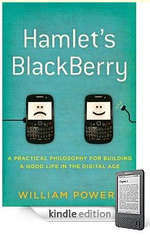I've been trying to fight through writer's block to post a review of the book "Hamlet's BlackBerry: A Practical Philosophy for Building a Good Life in the Digital Age" for weeks. (I even took a few stabs at a video review but have been unable to get the compression right when I post it to YouTube or Vimeo). So, back to analog, so to speak.
 "Hamlet's BlackBerry"
"Hamlet's BlackBerry" (sample chapter below) aims to make sense of the 24-7 onslaught of communication brought on by technology. The title plays off the fact that throughout history, people have felt overwhelmed by changes in communication, be they technical or sociological, and sought any number of solutions to find a sense of peace.
In Shakespeare's day, circa 1590, the intelligentsia could buy almanac-like tables whose specially coated paper allowed a person to write notes using a metal stylus, and erase them with a sponge. Hence, an erasable notepad, presumably invented to help one counter the growing demands on brainpower.
Hamlet s Blackberry author William Powers uses that and other historical examples dating to Greece in the 5th century B.C. through Thoreau in the late 19th century to explain that humans have often felt overwhelmed by the technology of the day.
It's good to know that history is on our side as we deal with even more demands on our time. I do believe that the relatively sudden appearance of addictive products like video games, Facebook and on-demand media have smothered us in comparison to technologies of the past, and that we're struggling to keep up and train our minds to adapt accordingly to specific circumstances.
But here's my beef with "Hamlet's Blackberry," and it's something I've been noticing more with recent books on business, sociology and culture: the story could have been told in a few chapters but instead was stretched in order to justify a $20-$25 hardcover price tag. A catchy title sometimes seems more important than the content within.
Here's where the recent wave of e-readers can come into play: Deliver your great idea and analysis in a concise form, charge less because you don't have the high upfront print publishing costs, and win more satisfied customers in the long run. Or for those readers who really want "bonus" chapters, charge more for those versions (print on demand publishers can feed those niches well). Or take the route of prolific author/blogger Steven Johnson, who intersperses his fully developed books with short essays on timely tightly focused topics published in major newspapers and magazines. It's the best of both worlds that only builds on his reputation as one of the great thinkers of our time.
Until then, I'll be more of a skeptic in deciding whether those book titles are more than window dressing. In a world of ever-shortening attention spans, I suppose that mindset can be seen as hypocritical but I beg to differ. I'll pay for quality insights and expertise but will draw the line on bloat when more than ever, time = money.